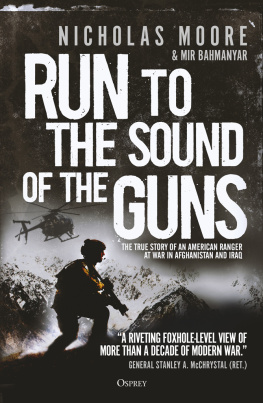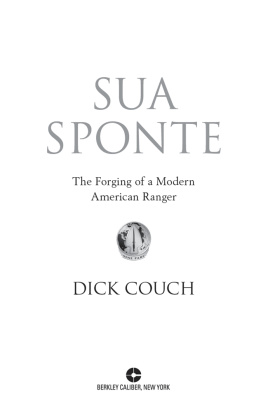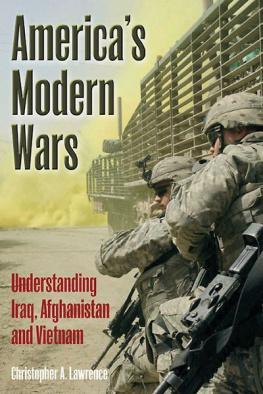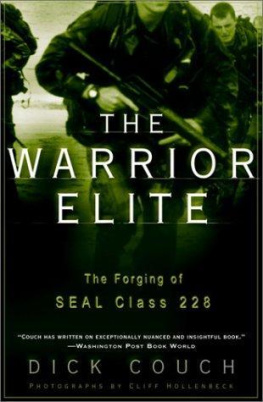A Tactical Ethic
A Tactical Ethic
moral conduct in the insurgent battlespace
Dick Couch
Author of Chosen Soldier and The Sheriff of Ramadi
NAVAL INSTITUTE PRESS
Annapolis, Maryland
The latest edition of this work has been brought to publication with the generous assistance of Marguerite and Gerry Lenfest.
Naval Institute Press
291 Wood Road
Annapolis, MD 21402
2010 by Dick Couch
All rights reserved. No part of this book may be reproduced or utilized in any form or by any means, electronic or mechanical, including photocopying and recording, or by any information storage and retrieval system, without permission in writing from the publisher.
Close Quarters Defense and CQD are registered trademarks and Internal Warrior, Hooded Box Drill, and Operational Physical Training (OPT) are trademarks of Duane Dieters Close Quarters Defense, Inc., and are used herein by permission of the owner.
ISBN 978-1-61251-420-8 (eBook)
The Library of Congress has cataloged the paperback edition as follows:
Couch, Dick, 1943
A tactical ethic : moral conduct in the insurgent battlespace / Dick Couch.
p. cm.
Includes bibliographical references and index.
1. WarMoral and ethical aspects. 2. Military ethics. I. Title.
U22.C68 2010
172.42dc22
2009047267
 Print editions meet the requirements of ANSI/NISO z39.48-1992
Print editions meet the requirements of ANSI/NISO z39.48-1992
(Permanence of Paper).
9 8 7 6 5 4 3 2
This work is dedicated to all those American warriors
in the insurgent battlespace who,
at additional personal risk,
conduct themselves in a moral and righteous manner
in the service of their nation.
Contents
The best description of combat leadership Ive read comes not from a military field manual or a serious work of history, but from a novel about the ancient Spartans. In Gates of Fire, author (and former U.S. marine) Steven Pressfield describes a Spartan officer in battle.
I watched Dienekes, re-forming the ranks of his platoon, listing their losses and summoning aid for the wounded.... The Spartans have a term for that state of mind which must at all costs be shunned in battle. They call it katalepsis, possession, meaning that derangement of the senses that comes when terror or anger usurps dominion of the mind.
This, I realized now watching Dienekes rally and tend to his men, was the role of the officer: to prevent those under his command, at all stages of battlebefore, during, and afterfrom becoming possessed. To fire their valor when it flagged and rein in their fury when it threatened to take them out of hand. That was Dienekes job. That was why he wore the transverse-crested helmet of an officer.
His was not, I could see now, the heroism of an Achilles. He was not a superman who waded invulnerably into the slaughter, single-handedly slaying the foe by myriads. He was just a man doing a job. A job whose primary attribute was self-restraint and self-composure, not for his own sake, but for those whom he led by his example.
Weapons and tactics change in warfare, but the human element in combat has remained largely the same across millennia: a good hoplite at Thermopylae in 480 BC would have looked a lot like a good cavalryman at Gettysburg in 1863 and a good infantryman in Helmand province in 2009. But popular portrayals of courage, aggressiveness, and loyalty are only half the story. Of equal importance are restraint, compassion, and honorqualities no less central to strong combat leadership, though they may be less romantic, and less easily caricatured on television.
Dick Couch knows this better than most of us. A Naval Academy graduate and veteran of SEAL Team One in Vietnam (where he led one of the few successful POW rescue operations of that war), he writes with the hard-earned knowledge of personal experience. The essence of his message in A Tactical Ethic is that our warrior culture must embrace the same passionate intolerance for unlawful and immoral acts on the battlefield that it currently has for leaving a comrade behind, and that our junior leaders have a continuous and never-ending duty to make this so.
Captain Couch has served in operational combat units, and knows that these things are easy to say, but harder to do. When young Americans join our ground forcesthe Army and Marine combat arms, and the special operations forcesthey seek to join what General David Petraeus calls the brotherhood of the close fight. They want to be part of the pack. Most have visions of glory and gunfights, not patience and proportionality. These aspects of military culture, however, are inextricably linked: true warriors must develop a firm moral platform from which they project power.
This obligation is borne most heavily by the commanders. The men who lead our teams, squads, platoons, and companies balance two often-conflicting demands: accomplishing their mission and taking care of their troops. In the heat of battle, when people are dying, it can be tempting to dismiss ethical considerations as a distant, and lesser, concern. That is wrong. Sound ethical conduct is absolutely essential to both mission accomplishment and troop welfare.
Doing the right thing is mission critical for at least three reasons. First, this is the era of the strategic corporal. Because of globalized media and the presence of journalists on the battlefield, individual actions by junior warriors can have national, strategic repercussionsfor good and for ill. Second, polls consistently show that the military is the most trusted institution in American lifemore than the police, the church, and even the Supreme Court. Maintaining that trust is a sacred obligation that helps to ensure the public support our warriors need in order to win. Third, the successful conduct of counterinsurgency is often counterintuitive to the principles of conventional warfare. American counterinsurgency doctrine, for example, includes a series of seemingly paradoxical statements: the more force is used, the less effective it is; the more you protect your force, the less secure you may be; sometimes doing nothing is the best reaction. The theme uniting these principles is an overriding concern for the safety and welfare of the civilian population. They, rather than a piece of terrain or the enemys forces, are the centers of gravity: protect them and persuade them, and we win; neglect them or kill them, and we lose.
Troop welfarethe duty to care for the sons and daughters entrusted to our combat leaderslikewise demands a strong tactical ethic. Every war eventually ends, and then the warriors revert to being private citizens again. They go on with their lives. Their leaders have a duty to do everything possible to ensure that they can look their children and grandchildren in the eye, and at themselves in the mirror, when talking about their service in wartime.
Given the centrality of tactical ethics to winning our fights and caring for our people, ethical training should not be separated from operational training. Moreover, training new recruits in the schoolhouse isnt enough. In order to succeed, ethical training must be a component of the tactical training that happens each day in small units throughout the military. Junior officers and NCOsour nations frontline combat leadersare duty bound to build and maintain not only the technical competence of their units, but also their culture and their moral health. They do this not for their own sake, but, like Dienekes, for those whom they lead by their example.






 Print editions meet the requirements of ANSI/NISO z39.48-1992
Print editions meet the requirements of ANSI/NISO z39.48-1992